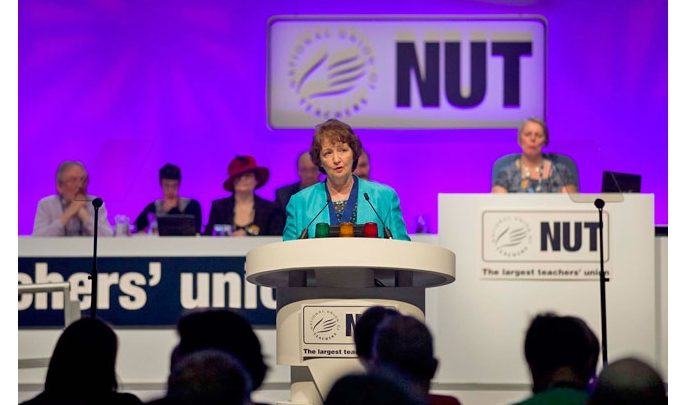Conference Catch-Up – NUT

In our second union conference round-up, we turn to the National Union of Teachers' gathering in Brighton…

- by Teachwire

Possibility of strike action It was agreed that the NUT will ballot its members over strike action, over the changes to teachers’ pay and conditions that would result from the government’s intention to turn all schools in England into academies.
According to NUT general secretary Christine Blower, ‘The crisis in teacher morale and teacher supply requires a new start for teachers’ pay. We need to see the pay cuts imposed under David Cameron and the attempts to dismantle the national pay structure reversed.
‘The introduction of performance related pay is an entirely unsuitable system for a profession where results depend upon the work of the whole school, not just individuals.’
Baseline testing boycott Conference attendees voted to ballot NUT members for a boycott of primary baseline assessments. The NUT and ATL both made their opposition to baseline assessments clear earlier this year, following the publication of a report [PDF] that criticised the testing of pupils at 4- and 5-years-old as being an inherently inaccurate indicator of future success, and as likely to further increase workloads on teachers.
Primary disapproval An NUT survey of 5,247 primary teachers [DOC] found that the vast majority took a dim view of the changes in recent years to primary assessment and their subsequent impact:
• 86% stated that their morale had declined in the last two years • 48% said they are considering leaving the profession within the next two years – 93% cited workload as a factor and 60% the swiftness with the curriculum has been changed. 50% said their decision to leave was motivated by mental health concerns. • 30% believed that their level of workload had increased ‘significantly’ since the launch the government’s launch of its Workload Challenge in 2014. • Regarding the new system of primary assessments, 97% of respondents believed they would be likely to brand children as ‘failures’, while 86% felt they had led to a curriculum that is too narrow.
Secondary reservations The conference also heard from a survey of 3,785 secondary teachers, the figures for which seemed to paint a similar picture:
• 85% felt that current accountability measures were having an adverse effect on the self-esteem, confidence and mental health of their students; a further 91% expressed the view that assessment accountability worked to undermine good teaching and learning • 59% reported there being fewer resources and materials for pupils at their school • 78% believed that mental health issues were having a negative impact on the academic performance of their pupils, with 71% doubtful that the counselling and mental support services available to their school were capable of meeting the level of need 61% said they were considering leaving the profession in the next two years
Action on pay and conditions for supply teachers Highlighting the discrepancy in pay for supply teachers versus permanent teaching staff, the NUT called on the government to develop a means of sourcing and supplying teachers similar to the Northern Ireland Substitute Teacher Register
As noted by Christine Blower, ‘At a time of drastic cuts to school budgets, it is nothing short of scandalous that companies are taking scarce financial resources from schools to boost their own profits. The NUT will be backing further lobbies of supply teacher agencies during the summer half term, in order to increase the pressure on companies to treat teachers fairly and to expose the scandal of agency pay and conditions.”
Prevent scepticism The conference saw the backing of Motion 23, which called for the scrapping of the government’s Prevent duty [PDF] for schools and childcare providers, requiring them to refer suspicions of radicalisation among children and young people to the police.
Attendees heard from a series of speakers who, while accepting that teachers had a role to play in protecting their students from the dangers of extremism, criticised Prevent for being crude and ineffective in its aims – and in some cases, harming relationships between schools and their local communities.
Speaking after the debate, Christine Blower commented, ‘Schools’ best contribution to countering any behaviour that could be a problem is by encouraging discussion. Some aspects of Prevent inhibit this and it is for this reason that we need a review of the strategy to find the right, and best way to protect children and young people. The NUT is calling on the Government to involve the profession in developing alternative strategies to safeguard children and identify risks posed to young people.”
Asbestos concerns The NUT also discussed its activities as a member of the Joint Union Asbestos Committee (JUAC), which campaigns for responsible management of asbestos risks and the long-term removal of asbestos from all schools and colleges).
Two recent incidents in particular were highlighted – one in the London Borough of Brent (PDF), involving the death from mesothelioma of a 40-year-old woman who had attended one of the area’s schools, and another involving an official complaint to Parliamentary Ombudsman by the JUAC concerning its the Health and Safety Executive’s decision to declare Cwmcarn High School in Wales safe for teachers and students, despite confirmation of asbestos contamination at the schools by qualified consultants – a complaint that was subsequently rejected [PDF].











